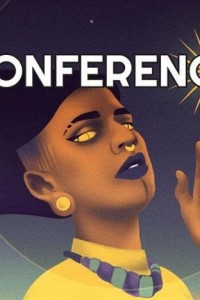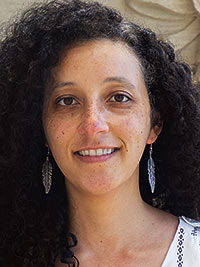Spotlight on: Liz Kerin

LIZ KERIN is an author, playwright, screenwriter, and graduate of the Rita and Burton Goldberg Department of Dramatic Writing at NYU Tisch School of the Arts. She is also the author of The Phantom Forest (2019). She lives in Southern California.
Tell us about your new novel, Night’s Edge — the world where it takes place, and the characters who live in that world.
Night’s Edge takes place in a world exactly like ours except that in 2010, a bizarre illness called Saratov’s Syndrome started spreading across the globe—a disease whose symptoms look a whole lot like vampirism. Our story toggles between 2010 and the present day as a young woman named Mia learns to care for her afflicted mother, Izzy, who survives by consuming fresh human blood every night.
Mia was just ten years old when Izzy’s boyfriend infected her with the disease. They’ve carved out a functional yet codependent life for themselves over the past 13 years, with Mia providing her own blood to her mother as sustenance. If anyone finds out Izzy is a carrier of the disease, she’ll be institutionalized for the rest of her unnaturally long life. They communicate with other “Saras” using secret channels on social media.
But Mia’s in her 20s now, and she’s started to wonder if there’s more to life than protecting her mother. The world has begun to adapt and open up (much like our own world, post-Covid). The climax of our story takes place at an underground music festival, where Mia’s crush, Jade, is performing. Mia is desperate to attend and skirt the strict rules both her mother and society at large have put in place. Creating this world was thrilling and cathartic for me, considering I wrote the first draft during the pandemic. Everything felt so immediate and tangible. I think, because of what we all went through collectively, this kind of speculative world feels even more grounded than it would have even five years ago. That being said, I think what truly grounds this book in reality are the morally gray family relationships. This is a story about how monstrous we can be to those we love most.
 Will you return to the setting of this novel in future work, or is it a standalone?
Will you return to the setting of this novel in future work, or is it a standalone?
Night’s Edge actually has a sequel! The second book in the duology, First Light, will be out on April 23rd, 2024 from Tor Nightfire. It was so exciting to return to this world and expand it as Mia matures and confronts her demons (literally!). I’ll try to avoid spoilerific language here, but the sequel revolves around the online underbelly of Sara culture as well as what really happens inside all these secret institutions for Saras. I absolutely loved taking all this worldbuilding to the next level, and I can’t wait till next April when everyone can continue the journey with us.
In addition to prose writing, you’re also a playwright and screenwriter. What are the advantages and disadvantages of those different forms? How do you decide which format is right for a given idea?
Night’s Edge is a great example of how fluid those mediums can be for me. I actually conceived of it as a feature film several years ago, then decided to explore the character relationships in prose instead. Because Mia’s been so sheltered and traumatized, her experiences are tough to externalize. The inside of her head was like this little jewel box I was determined to crack open. I wrote Night’s Edge as a short story, then ultimately turned it into a longer novel. Immediately, her voice became clear to me. I often feel it on a gut level, when I’m writing a story in the correct medium (or not!). That being said, it’s now being adapted as a TV series, so we’re coming full circle!
What can you tell us about the process of adapting Night’s Edge for television? Will you be involved in the screenwriting?
I am indeed writing the pilot script, as well as executive producing. I’ve been fortunate enough to learn from the incredible Jac Schaeffer, who created Wandavision for Marvel/Disney+. She took Night’s Edge under her wing a couple years back, and has helped guide me toward a version of the show that externalizes Mia’s drama while also honoring her very sheltered, conflicted character traits. That was a tough needle to thread, and we’ve all been working really hard. I was so lucky to get to learn from this insanely inspiring (all female!) team. There aren’t any new updates, beyond the existence of a pilot script. TV development is a slow burn. But hopefully there will be more to share soon!
What writers, inside and outside the SF/fantasy/horror genres, influenced you? Have you always been a reader of speculative fiction?
When I was in fourth grade, my teacher assigned us The Giver and it changed everything I thought I knew about my taste in books. From that moment on, I was voracious for speculative worlds. Another one of my favorites as a kid was A Wrinkle in Time. When I got older, I dove headfirst into a lifelong obsessions with Margaret Atwood and Octavia E. Butler. My newest Mount Everest additions are Carmen Maria Machado, Mona Awad, and Catriona Ward. That being said, I love reading outside my genre, and I adore memoirs and literary fiction. Some books that influenced Night’s Edge that people wouldn’t expect are The Glass Castle by Jeannette Walls, The Round House by Louise Erdrich, and I’m Glad My Mom Died by Jennette McCurdy.
Is there anything else you’d like our readers to know? Upcoming work or other projects of note?
Night’s Edge is the first time a lot of people have read my work, but it’s actually not my debut. I released a dark YA novel in 2019 called The Phantom Forest and I’m hoping to revisit that world sometime in the near future! It was a creepy little tale about what might happen if humanity discovered the truth about what happens to us after we die. There was a dystopian Underworld and a human sacrifice ritual gone terribly wrong. It was weird and gory and unexpectedly romantic, and I’m dying to get back there someday!
 While you are here, please take a moment to support Locus with a one-time or recurring donation. We rely on reader donations to keep the magazine and site going, and would like to keep the site paywall free, but WE NEED YOUR FINANCIAL SUPPORT to continue quality coverage of the science fiction and fantasy field.
While you are here, please take a moment to support Locus with a one-time or recurring donation. We rely on reader donations to keep the magazine and site going, and would like to keep the site paywall free, but WE NEED YOUR FINANCIAL SUPPORT to continue quality coverage of the science fiction and fantasy field.
©Locus Magazine. Copyrighted material may not be republished without permission of LSFF.








